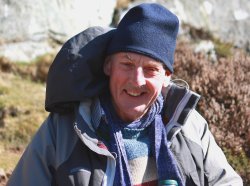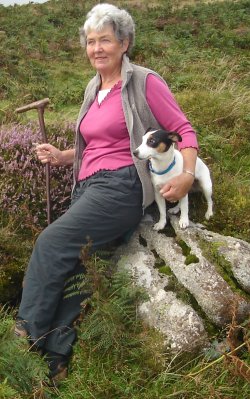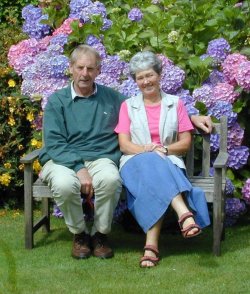David
A Profile of David & Sue Halpin
 David and Sue Halpin are courteous and welcoming, a picture of peaceful professional retirement in a pretty corner of Dartmoor, overlooking Hay Tor. Yet appearances are deceptive, for David rails against injustice and fights for the rights of humanity, particularly for those oppressed by war. I will carry on working for justice, and justice in the treatment of others, until I die, he vows. These are not mere words; David Halpin has given his money and risked his life to fight for his cause and fully intends to go on doing so.
David and Sue Halpin are courteous and welcoming, a picture of peaceful professional retirement in a pretty corner of Dartmoor, overlooking Hay Tor. Yet appearances are deceptive, for David rails against injustice and fights for the rights of humanity, particularly for those oppressed by war. I will carry on working for justice, and justice in the treatment of others, until I die, he vows. These are not mere words; David Halpin has given his money and risked his life to fight for his cause and fully intends to go on doing so. What is it that motivates a man to challenge the government on its foreign policy and take on the world to champion the rights of minority groups? Moral integrity forms part of the answer for David, and its development can be traced throughout his life and career.
Born in Lyndhurst in 1940, David moved to Bournemouth with his family when he was five. Halpin is an Irish name, and the family originated in Limerick, where grandfather Halpin worked as a chartered engineer. Davids father set up a family electronics business, and his mother helped by doing the book keeping. David was the eldest of their four children, and times were tough after the war, when purchase tax was ruthlessly used to constrain consumer spending. David is tall and can seem forbidding as he says, I often look fierce but Im very gentle most of the time! and this is probably the result of his early life. He learned tenderness and the ability to nurture from his mother, as he watched her caring for his younger siblings. She loved babies and enthused about their hands, calling them little starfish. David admits, A lot of my drive to stop cruelty in the world comes from my mother. He is motivated by his love of children: When I look at my three grandchildren, Isobel, Nel and Delilah, I see two billion of the worlds children they are all equally precious and not one of them should be harmed.
 David attended Shaftesbury Grammar School, a state boarding school. He is deeply committed to state education; both his own children were educated in the state system, and David considers himself fortunate to have benefited from free schooling and medical training at university in the days before student loans mortgaged the future of our professionals. Shaftesbury was an academic school with good masters and strong leadership, he states. He enjoyed sport at school, particularly clean and fast rugby. Leaving Shaftesbury with two A levels (he failed Physics), David went on to medical school at St Marys, Paddington: A hospital built in the 1850s, and full of good spirit.
David attended Shaftesbury Grammar School, a state boarding school. He is deeply committed to state education; both his own children were educated in the state system, and David considers himself fortunate to have benefited from free schooling and medical training at university in the days before student loans mortgaged the future of our professionals. Shaftesbury was an academic school with good masters and strong leadership, he states. He enjoyed sport at school, particularly clean and fast rugby. Leaving Shaftesbury with two A levels (he failed Physics), David went on to medical school at St Marys, Paddington: A hospital built in the 1850s, and full of good spirit. Here he switched his enthusiasm from rugby to rowing, becoming Captain of Boats. He thoroughly enjoyed his time at St Marys, thriving in the apprenticeship system that trained 30 boys and 30 girls each year, soaking up the ethos, attitude and excellent teaching that insisted all students did their best for their patients. During this training David met his future wife, a nurse.
It was Dr David and Nurse Sue like a romantic novel, jokes Susan Halpin. The young couple married in 1961, and lived on the £10 a week Sue earned nursing plus David's County Major Award grant. Few medical students were married in the 1960s, and life was financially restricted until David qualified in 1964! A variety of jobs followed, including teaching anatomy at Kings College, London, and working as a senior house officer at Bristol. It was in Bristol that the Halpins really settled down, buying a house and adopting two children, Andrew and Fiona. A glittering career followed switching from general surgery to orthopaedics led to posts at Exeter and Truro, six months teaching at Harvard, and finally, to appointment as a consultant at Torbay and Princess Elizabeth hospitals in 1974. David also ventured into private practice. The intensely competitive nature of the surgical world drove that choice for him; success was often measured by the popularity of a surgeons private practice.
However, David and Sue were not seduced by success. They wanted to adopt another child, but were encouraged instead to foster and fourteen children, from newborns to 16-year-olds, including three pairs of siblings, would call the Halpins Home House in Combe-in-Teignhead their refuge for a while. David also cared deeply for Princess Elizabeth Orthopaedic Hospital in Exeter, and battled fiercely to prevent its closure. Before this he fought Thatcher's Internal Market but that battle was lost. He loved his job, and left only when forced to take early retirement for medical reasons. Even then he continued, long after his official retirement, to do operating lists for colleagues to help their waiting lists. He also held clinics for orthopaedic problems in local GPs surgeries, and these were valued and economic.
I am always involved in the present, states David. He is, indeed, a man who lives intensely for the current project, who throws everything he possesses into the fight to achieve what he believes to be right. He is passionate about the plight of the Palestinian people and was vehemently opposed to the wars on Afghanistan and Iraq. In 2002 David was racking his brains about a way to help the dispossessed Palestinians, whose country has been taken in large part by Israel, when a brilliant idea occurred to him. He would buy or charter a boat, fill it with food and medical supplies, and sail to Palestine. I thought that a boat was unstoppable it was a glorious, swashbuckling idea which caught everyones imagination, explains David: It was symbolic. The media loved the idea and their publicity was the first Sue heard of the trip. She initially cried with shock but then rallied, and supported David to the hilt. The voyage of The Dove and the Dolphin in the Danish MV Barbara started from Haldon Quay, Torquay on 1st February 2003 and finished the 3,100 sea miles to Gaza sixteen days later. The £70,000 cost of the mercy ship mission was paid by the Halpins from savings (they sold their house) and over £20,000 of donations from the public paid for the food. Money is no good in the bank when there are people suffering, asserts David. The voyage was a success, the Palestinians received the aid David Halpin supplied, and the publicity raised international consciousness of the Palestinian plight. David continues to work for the Palestinian cause, visiting the country six times since the voyage.
This Good Samaritan is active in all cases where he perceives the need for justice. David vehemently opposed the wars in Afghanistan and Iraq, deploring the destruction of people and their medical services. He also entered the public arena, with a group of other doctors, to seek a proper investigation of Dr David Kellys death. He says it is impossible that Dr Kelly died of haemorrhage from one small wrist artery, which is the first official cause of death. Furthermore, he considers it preposterous that this top scientist who knew all about the biology of death would have chosen a blunt pruning knife and co-proxamol tablets for his suicide. David Halpin was the first to publish these questions. Dr Kelly's part, be it primary or secondary, in pointing to the Weapons of Mass Destruction scam, continues to be revealed he says.
For a man so emotionally committed to good causes, David is very modest about his achievements: Ive used all my ingenuity and a tremendous amount of energy, and money, and spent almost all my working hours striving for justice in Palestine and Iraq. Yet apart from providing comfort for some youngsters in Gaza, Ive achieved nothing. Many would disagree among them the Palestinians helped by his aid and encouraged by his support; the injured of Iraq, desperate for the medical services David fights to reinstate; and all those who believe in justice and morality rather than government spin and cover-ups. Edmund Burke wisely said, All that is necessary for the triumph of evil is that good men do nothing. David Halpin is doing a great deal.
This profile of David and Sue Halpin first appeared in the Ilsington Parish Magazine.
Profile of David - old version
Profile of David Halpin MB BS FRCS
 Aged
64. Married to Susan a trained orthopaedic and general nurse. Schooled
at Shaftesbury Grammar School and trained in medicine by the state at
St. Mary’s in Paddington. 1970 – 75 trained in orthopaedic and trauma
surgery at Princess Elizabeth Orthopaedic Hospital, Exeter with one
year at the Royal Cornwall Hospital.
Aged
64. Married to Susan a trained orthopaedic and general nurse. Schooled
at Shaftesbury Grammar School and trained in medicine by the state at
St. Mary’s in Paddington. 1970 – 75 trained in orthopaedic and trauma
surgery at Princess Elizabeth Orthopaedic Hospital, Exeter with one
year at the Royal Cornwall Hospital.Always independent of mind and a sceptic, this being of course an essential quality in a scientist and doctor. Politically radical but never a member of a party and a very committed life within specialties that were much in demand meant that political action was damped. He was galvanised by the B52s being used to bomb Afghan civilians from 32,000 ft after he had joined with millions in calling for an analytical and judicial response to the cataclysm of ‘9/11’. He has spent most waking hours since then listening, writing, speaking and marching for justice and peace.
He is best known publicly for chartering a cargo vessel to carry symbolic amounts of food, clothing and medical supplies to the poorest folk in Gaza in February 2003 to focus ttention on an unresolved conflict of 55 years duration and secondly to stand for peace and reason against the violence and unreason of a looming and illegal war on a broken country to the east of Palestine. He says he is motivated by the child. He looks into the eyes of his two lovely grandchildren and sees in them the eyes of the world’s two billion children. He believes that not one should be harmed and that belief distinguishes him and many others from many world leaders.
For relaxation he maintains the 35 acre of woods he had planted/planted and uses his hands making ash hay rakes for instance. Sue and he are lucky to be able to step out on to Dartmoor, which they cherish more and more, with their two dogs.
Copyright © by David Halpin. All Right Reserved.



